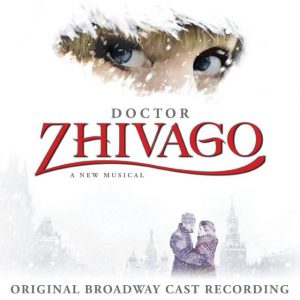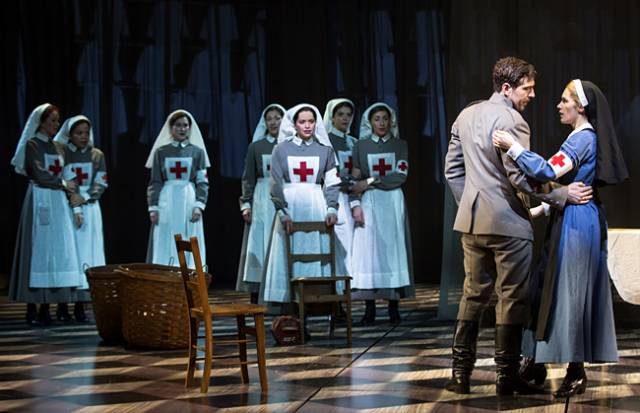
 Doctor Zhivago had the inauspicious title of being the first show to close on Broadway when the Tony nominations were announced in May. It had received no nominations and after poor notices, and a poorer box performance, the production closed after 26 previews and 23 regular performances. In the 21st century, though, unsuccessful productions that close early are not left as mere memories for the few who saw them. Musical theatre enthusiasts are lucky to live in a time when less successful shows still manage to eke out cast recordings. (In fact, in this past season only one show – Holler If Ya Hear Me – received no professional cast recording.) And, having not seen the production, I’m grateful it’s the sumptuous recording released by VIVA!DIVA! productions that is my entry point to the stage production of Doctor Zhivago.
Doctor Zhivago had the inauspicious title of being the first show to close on Broadway when the Tony nominations were announced in May. It had received no nominations and after poor notices, and a poorer box performance, the production closed after 26 previews and 23 regular performances. In the 21st century, though, unsuccessful productions that close early are not left as mere memories for the few who saw them. Musical theatre enthusiasts are lucky to live in a time when less successful shows still manage to eke out cast recordings. (In fact, in this past season only one show – Holler If Ya Hear Me – received no professional cast recording.) And, having not seen the production, I’m grateful it’s the sumptuous recording released by VIVA!DIVA! productions that is my entry point to the stage production of Doctor Zhivago.
The cast recording comes with a digital booklet featuring a very comprehensive plot outline and lyrics (with excellent images) and an introduction by musicologist of American song Jonathan Schwartz. It seems a shame, though, that there is no additional introduction from composer Lucy Simon (of the excellent melodies of The Secret Garden) or Michael Korie and Amy Powers, the two lyricists. But what we do have is something to appreciate. Even when Doctor Zhivago fails to achieve its goals, it remains a worthy recording. It is not easy putting on a musical, and it is not easy putting on a musical that does not make money. Although many musical theatre purists decry the commonness of books turned to musicals, there’s something interesting in watching a single story transposed across mediums, and from the classic novel to the eventually classic film, it has been interesting to see what elements are retained in the story of the eponymous Doctor Zhivago and his doomed love affair in the Russian Revolution. The sort of politically charged, decades-spanning tale which Doctor Zhivago tells is an immediate challenge for creators, but what emerges in the score is an interesting observation of how to tame so wild a story.
Early on it’s clear the musical team is aware of how much information they have to transfer to the audience, lending an over-urgent tone to the music. The best lyrics are never borne out of such utilitarian demands and the early songs of Doctor Zhivago belie the difficult dual task of trying to explore much and instilling as much dramatic irony as possible in every rhyme. Lines like "the only revolution is the one inside your heart" are too pithy to be glorious. The very first song reveals the immediate trouble the musical team faces exploring the issues at the centre of the tale (the opening number speaks of two worlds, but the gargantuan tale at hand speaks of three, four, five worlds colliding). Anachronistic lines are used as shorthand to telegraph incidences to the audience, but the early songs suffer from never knowing just how to let the humour land (“It’s A Godsend” is a key example); but, even while the lyricists are trying to control the story, Simon’s score (positively soaring in the best of places) is an immediate highlight of the recording.
The first unimpeachable beacon of the recording is a goodbye duet between Yuri and Tonia, “Watch the Moon”. Doctor Zhivago is remembered for its ornate epic nature, but this delicate, simple duet becomes a key song because it thrusts the score into surer grounds. By the middle of Act One (“Forward” as the soldier sing on the front) the anachronisms seem more charming than effortful and the score seems surer of itself, not forced to traverse wide expanse but focused on a single story of multiple persons becoming disillusioned as the war gets underway. “Forward” is a good indication of where the score thrills; not with specific melodies like “When the Music Played” or even the lovely “Now” (a gorgeous solo but not the score’s apex). Simon, Powers and Korie thrill on choral numbers like the brief nurses' reprieve “Somewhere My Love” or the explosive “Blood on the Snow”, which follows a reprise of “Forward” – music and lyrics are at one in a natural way with “Blood on the Snow” creating some visceral urgency in the score. When musicals are exploring such wildly different themes, one theme always reveals itself as more effectively done than the others, and with Doctor Zhivago the team show themselves to be most adept with the larger political themes. The Act One closer, the plaintive “In this House”, has families look back on lives they're losing -- a resonant theme that evokes greater significance when mixed with a reprise of the rebels' anthem “Blood on the Snow”, the dissonant counterpoint which sees the two songs sung together as the act closes. It’s a sharp choice of the team and unlike the less surefooted opening number literally shows how the world is affected when the two worlds collide. The pithy choice to have two varying musical strands collide for the effect is charming. Even better, the excellent Act One closer suggests better to come. Act Two of the score strongly improves on Act One.
 The second act starts with a delightful folk music-inspired number injecting distinct verve into the score in the form of “Women and Children”, which the female ensemble sings. “Women and Children” is the kind of song Doctor Zhivago needs, for myriad reasons. The folk flavour of the choral numbers is the one to most effectively blend attributes of the Russian music attributes with Broadway theatricality. It works as an act opener, suggesting the issues at hand while still feeling complete and whole as a number, but most importantly, it’s “Women and Children” which reveals the somewhat hidden feminist centre of the show. The pithy humorous tone of the song as the women realise they do not need the men to get by is not just for levity (“No one to beat me / No one to drink and whore/ Leave me the vodka. / Let them go to war!") but an essential point to be made about life during war, and the triad team responsible for the score is two-thirds women. If only the score had attached itself more to this; even though the number might seem a sliver of a song, it remains the most confident song on the recording. It’s matched by our only female-female duet, later in the act when lover and wife meet (“It Comes As No Surprise”) revealing, again, the musicians' wily understanding of the subtler women’s issues at hand. Just for that feminist wisdom, Zhivago reveals itself as much more than negligible.
The second act starts with a delightful folk music-inspired number injecting distinct verve into the score in the form of “Women and Children”, which the female ensemble sings. “Women and Children” is the kind of song Doctor Zhivago needs, for myriad reasons. The folk flavour of the choral numbers is the one to most effectively blend attributes of the Russian music attributes with Broadway theatricality. It works as an act opener, suggesting the issues at hand while still feeling complete and whole as a number, but most importantly, it’s “Women and Children” which reveals the somewhat hidden feminist centre of the show. The pithy humorous tone of the song as the women realise they do not need the men to get by is not just for levity (“No one to beat me / No one to drink and whore/ Leave me the vodka. / Let them go to war!") but an essential point to be made about life during war, and the triad team responsible for the score is two-thirds women. If only the score had attached itself more to this; even though the number might seem a sliver of a song, it remains the most confident song on the recording. It’s matched by our only female-female duet, later in the act when lover and wife meet (“It Comes As No Surprise”) revealing, again, the musicians' wily understanding of the subtler women’s issues at hand. Just for that feminist wisdom, Zhivago reveals itself as much more than negligible.
Act Two’s later focus on the romance finds stronger success than in the previous act with “Love Finds You” (a thoughtful quintet, even if Komarovsky becomes a negligible character on the recording with nary a song that demands inclusion) and especially “On the Edge of Time”, revealing surprising heights for Simon’s music.
Doctor Zhivago’s score might not be an unmitigated success, but in musical theatre world recently there is an unfortunate desire to too quickly declare shows complete hits or complete failures. Zhivago’s score is not without its kinks, but it is an impressive and ambitious score piece. Tam Mutu as Zhivago sings well, but for the men, it’s Paul Alexander Nolan’s expressive tenor that’s most impressive. Like Courtenay on film, he lends a dignified air to Pasha despite the few numbers he sings on. Kelli Bartlett and Lora Lee Gayer (you might remember her as a lively young Sally in the revival cast recording of Follies) emerge as the recording’s stars, two excellent singers that demand shows built around their expressive voices.
This past musical season has had many shows and many cast recordings to last a lifetime, but even for its issues Doctor Zhivago’s recording deserves more than just a cursory listen. As I write this final paragraph I’m already queueing up the Act Two opener for a tenth consecutive listen. “Women and children keep the earth turning” -- Korie and Powers know what they’re on to with those lyrics. Don’t let the title of the show fool you, Doctor Zhivago is really about the women – especially the excellent composer Lucy Simon responsible for those soaring melodies.